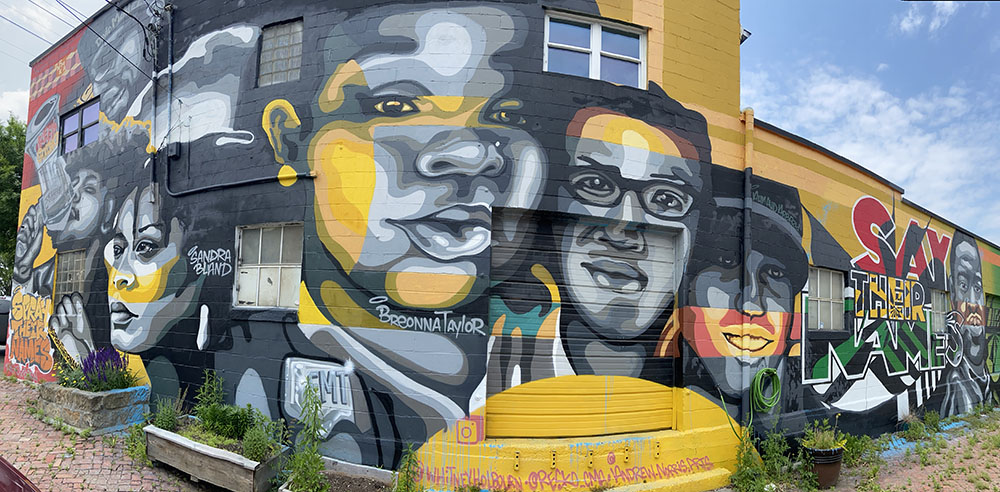
"Say Their Names" mural in Louisville, Kentucky (Eilis McCulloh)
Last week, I spent time in Louisville, Kentucky, for a little vacation. While looking for things to do, I came across a website that listed a number of murals in the city. "Say Their Names" caught my attention. The mural depicted Breonna Taylor, George Floyd, Ahmaud Arbery and other Black individuals who had been brutally murdered. I was drawn to the mural as a way to memorialize Taylor in her own hometown of Louisville.
At that time, I could not fathom that, only a few days later, our country would be reeling from another mass shooting, fueled by white supremacism and vile hatred.
We know that incidents of violence and racism surround us in our cities, country and world. It is impossible to go one day without seeing or reading a news story about a mass shooting, the banning of critical race theory, or some other atrocity. Yet, I was still shocked when, on Saturday evening, I saw the news about the massacre at the Tops grocery market in Buffalo, New York.
Ten dead.
Racism.
Manifesto.
Tackled, appearing in court ...
Pleaded not guilty.
Eighteen.
Radicalized online in less than two years.
One thought kept running through my mind while I watched the initial news reports. If the killer had been a Black man, would he have been shot dead by police instead of placed in restraints?
This question plays into the way the media talked about the killer. Often, he was referred to as "a potential suspect" or described as "a smart kid." We know that's not the way in which a Black or brown suspect is described in the news. All too often, they are described by their size, actions and skin color. As suspects, their humanity is immediately stripped from them. However, this was not the case this time.
Language matters. The man currently held for the murders of 10 individuals in Buffalo is not just a "suspect" or "nice kid" or a "shooter" or "gunman" or "assailant." We need to call him for what he is: a domestic terrorist, a white supremacist, a murderer. I am not alone in my thinking. Over the past few days, I have read exasperated social media posts calling our attention to the language used by the news media.
In his speech in Buffalo, President Joe Biden echoed the need for a shift in language. He said, "What happened here is simple and straightforward: terrorism. Terrorism. Domestic terrorism. Violence inflicted in the service of hate and the vicious thirst for power that defines one group of people being inherently inferior to any other group."
Advertisement
Here, Biden powerfully named the incomprehensible actions for what they are: domestic terrorism — an action to counteract the so-called "replacement theory." Biden went on to call white supremacy a poison that is "running through our body politic [and] it's been allowed to fester and grow right in front of our eyes."
By consciously shifting our language, we remind ourselves that we can no longer distance ourselves from the sin of racism that pervades our entire lives. We cannot allow fear to soften our response to the racist ideologies threatening to take over our country. We cannot let our deep desire to maintain peace between different factions stop us from demanding legislation that will put an end to massacres in Buffalo (and elsewhere).
To that end, I ask all of us:
When is enough enough?
When will we be able to stop writing statements condemning violence and guns and racism?
When will we stop pushing legislation that prevents critical race theory and common-sense gun safety?
When will the weight of our collective voices win out, and we can celebrate the creation of gun legislation for which we have been crying?
How many more memorial murals must be created?
Again, in his speech Biden answered these questions. He said, "We need to say as clearly and forcefully as we can that the ideology of white supremacy has no place in America. Silence is complicity. It's complicity. We cannot remain silent."
As women religious, we cannot remain silent. As human beings, we must be willing to "make good trouble." Each of us must have the courage to hold ourselves accountable. We must demand that our communities, churches, organizations and dioceses denounce the sins of white supremacy, racism and violence in all forms. And we must have the courage to move our statements of solidarity and grief into action now. Time is of the essence.





